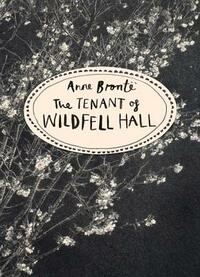You need to sign in or sign up before continuing.
Take a photo of a barcode or cover
While I haven't read the Introduction and the notes at the time of writing this review (and I do not want to put writing it away for later), I have the read the main contents of The Tenant of Wildfell Hall, and, overall, it is a very good novel that is absolutely worth reading. (Yes, I'm aware how stellar of an introductory paragraph this is.)
I usually talk about the plot here in a spoiler-free manner, but, as was the case with The Bands of Mourning, the blurb does that well enough, and I cannot add anything to it or provide a worthwhile replacement. Just read the blurb -- that much is sufficient.
The book has a certainly unusual structure -- to me, at least: it is framed as a series of letters addressed to one J. Halford (who never appears in the story itself) by our protagonist Gilbert Markham, and the middle portion of the book is one giant flashback framed as entries in the diary of Helen Graham. But it certainly works, though at times I did feel the pacing to be too slow in the middle. Speaking of pacing -- overall, it is slow, as you perhaps would expect, and, I would say, comparable to the pacing of Jane Eyre. I like slow-paced books (though the book did start to drag a bit in the middle before quickly picking up pace again -- unlike Jane Eyre which never slowed down for me), though you might not have so much patience as me. The book is unflinching in its depiction of debauchery and alcoholism and, to put it mildly, marriage problems. Boldly, powerfully, and harrowingly so. Poor Helen. Speaking of...
Of all the characters in this book, Helen was my favourite. I wouldn't put her high in my all-time list of favourite characters, but she's easily the best part of the book -- it's her story, after all. I can list quite a few things that I like about her (her amazing resilience and wisdom, for instance), but here I will mention two things that I didn't like about her -- first, she appeared too perfect. She, save for one massive slip-up that cost her dearly, is almost always right about things and people, and by golly does she like to moralise. A lot. Aside from her, the only character I feel very strongly about is Arthur Huntingdon. Let's just say I dislike him as much as Joffrey and the Mountain. I don't feel that strongly about the other characters -- Gilbert was funny at times, Lord Lowborough was tragic but... I won't say anything more regarding his fate, actually, for fear of spoilers, Walter quickly became creepy, Hattersley surprised me, and the rest of the side characters too were good and I think everyone (or almost everyone) got neat conclusions by the time the story ended.
Alright, what else to talk about...
Prose: Not too different from Charlotte's prose. Plenty of detailed descriptions.
Dialogue: typical Victorian dialogue, elevated but not incomprehensible, wittier than Charlotte's dialogue, if I remember correctly.
Tone: Mysterious and dramatic at first, then tragic, then, uh, spoilers for the ending.
Overall? While Anne Brontë isn't as famous as her sisters, she absolutely is worth reading. As of why four stars instead of five when I've said nothing in way of shortcomings, well, if you've read my review of The Emperor’s Soul, you already know why: the fifth star is reserved for books that I absolutely adored. The Tenant of Wildfell Hall, while being definitely liked, does not quite reach that status, hence the four stars.
I usually talk about the plot here in a spoiler-free manner, but, as was the case with The Bands of Mourning, the blurb does that well enough, and I cannot add anything to it or provide a worthwhile replacement. Just read the blurb -- that much is sufficient.
The book has a certainly unusual structure -- to me, at least: it is framed as a series of letters addressed to one J. Halford (who never appears in the story itself) by our protagonist Gilbert Markham, and the middle portion of the book is one giant flashback framed as entries in the diary of Helen Graham. But it certainly works, though at times I did feel the pacing to be too slow in the middle. Speaking of pacing -- overall, it is slow, as you perhaps would expect, and, I would say, comparable to the pacing of Jane Eyre. I like slow-paced books (though the book did start to drag a bit in the middle before quickly picking up pace again -- unlike Jane Eyre which never slowed down for me), though you might not have so much patience as me. The book is unflinching in its depiction of debauchery and alcoholism and, to put it mildly, marriage problems. Boldly, powerfully, and harrowingly so. Poor Helen. Speaking of...
Of all the characters in this book, Helen was my favourite. I wouldn't put her high in my all-time list of favourite characters, but she's easily the best part of the book -- it's her story, after all. I can list quite a few things that I like about her (her amazing resilience and wisdom, for instance), but here I will mention two things that I didn't like about her -- first, she appeared too perfect. She, save for one massive slip-up that cost her dearly, is almost always right about things and people, and by golly does she like to moralise. A lot. Aside from her, the only character I feel very strongly about is Arthur Huntingdon. Let's just say I dislike him as much as Joffrey and the Mountain. I don't feel that strongly about the other characters -- Gilbert was funny at times, Lord Lowborough was tragic but... I won't say anything more regarding his fate, actually, for fear of spoilers, Walter quickly became creepy, Hattersley surprised me, and the rest of the side characters too were good and I think everyone (or almost everyone) got neat conclusions by the time the story ended.
Alright, what else to talk about...
Prose: Not too different from Charlotte's prose. Plenty of detailed descriptions.
Dialogue: typical Victorian dialogue, elevated but not incomprehensible, wittier than Charlotte's dialogue, if I remember correctly.
Tone: Mysterious and dramatic at first, then tragic, then, uh, spoilers for the ending.
Overall? While Anne Brontë isn't as famous as her sisters, she absolutely is worth reading. As of why four stars instead of five when I've said nothing in way of shortcomings, well, if you've read my review of The Emperor’s Soul, you already know why: the fifth star is reserved for books that I absolutely adored. The Tenant of Wildfell Hall, while being definitely liked, does not quite reach that status, hence the four stars.
emotional
tense
slow-paced
Plot or Character Driven:
Character
Strong character development:
Complicated
Loveable characters:
Yes
Diverse cast of characters:
No
Flaws of characters a main focus:
Complicated
challenging
emotional
funny
hopeful
reflective
sad
slow-paced
Plot or Character Driven:
Character
Strong character development:
No
Loveable characters:
No
Diverse cast of characters:
No
Flaws of characters a main focus:
Yes
From the introduction:
The Tenant of Wildfell Hall, came out in 1848. The bold story of a strong-minded woman’s struggle for independence, the book unmasked the dark brutality of Victorian chauvinism but was nevertheless attacked by some critics as a celebration of the very excesses it criticized.
The Tenant of Wildfell Hall, came out in 1848. The bold story of a strong-minded woman’s struggle for independence, the book unmasked the dark brutality of Victorian chauvinism but was nevertheless attacked by some critics as a celebration of the very excesses it criticized.
emotional
hopeful
reflective
sad
slow-paced
Plot or Character Driven:
Character
Strong character development:
Yes
Loveable characters:
Yes
Diverse cast of characters:
Yes
Flaws of characters a main focus:
Complicated
dark
emotional
reflective
tense
medium-paced
Plot or Character Driven:
Character
Strong character development:
Yes
Loveable characters:
Complicated
Diverse cast of characters:
No
Flaws of characters a main focus:
Yes
I think this is my favourite of all the Bronte novels, and one that I hadn't read in ages. Loved it.
emotional
hopeful
inspiring
reflective
tense
medium-paced
Plot or Character Driven:
A mix
Strong character development:
Yes
great and brilliant and everything (anne brontë is a genius), but i can’t emphasize enough how this book makes me feel PHYSICALLY ILL. IT’S SO UPSETTING TO READ. LAGSOAIAFQNSIQY!!!!!!
emotional
inspiring
reflective
sad
slow-paced
Plot or Character Driven:
A mix
Strong character development:
Yes
Loveable characters:
Complicated
Diverse cast of characters:
No
Flaws of characters a main focus:
Yes
O livro é bem lento, mas gostei mesmo assim, é engraçado como o Gilbert cai de amores pela Helen com uma rapidez absurda e o modo dele de pensar da muita raiva em vários momentos, mas pra época da pra entender e pensando bem é bem contemporâneo ainda... Os floreios que ele faz escrevendo sobre ela bonitinho, não tem como negar kk.
A segunda parte do livro é baixaria total, essa pobi leva muito chifre mds, o marido dela é o próprio cão, não tinha raiva dele no começo, mas nossa eu peguei muito abuso dele.
No todo fiquei muito surpresa com o quão feminista é esse livro, os pensamentos da Helen, como sã mostradas as coisas erradas em casamento, religião, sociedade e a personagem é fodona, sofre? Sofre, mas a bicha foi grandona demais pra época. Anne vc me surpreendeu viu, mas seria muito bom dar uma esclarecida sobre o ambiente e as pessoas, pq poxa, é muito ruim ler e não conseguir visualizar nem o ambiente nem um pouquinho a aparência das pessoas.
A segunda parte do livro é baixaria total, essa pobi leva muito chifre mds, o marido dela é o próprio cão, não tinha raiva dele no começo, mas nossa eu peguei muito abuso dele.
No todo fiquei muito surpresa com o quão feminista é esse livro, os pensamentos da Helen, como sã mostradas as coisas erradas em casamento, religião, sociedade e a personagem é fodona, sofre? Sofre, mas a bicha foi grandona demais pra época. Anne vc me surpreendeu viu, mas seria muito bom dar uma esclarecida sobre o ambiente e as pessoas, pq poxa, é muito ruim ler e não conseguir visualizar nem o ambiente nem um pouquinho a aparência das pessoas.






